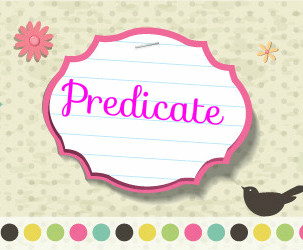Predicate
The predicate is the one that tells us what the subject is or does. It’s part of the clause, actually, it is everything that isn’t the subject. / O predicado é o responsável por nos dizer o que o sujeito é ou faz. Ele é parte da oração, na verdade, é tudo o que o sujeito não é.
The main part of the predicate is a verb, but it’s not the only thing, a predicate can contain direct objects, indirect objects and many different kinds of phrases. / A parte principal do predicado é o verbo, mas ele não possui apenas isso, pois pode conter objeto direto e indireto, bem como diferentes tipos de orações.
The subject and the predicate are the parts of a sentence. The subject is the sentence itself, what the sentence is about and the predicate is the information about the subject. / O sujeito e o predicado são partes de uma oração. O sujeito é a oração em si, ou seja, do que se trata a oração, e o predicado é a informação sobre o sujeito.
Bellow we have some examples of predicates in red, take look: / Abaixo temos alguns exemplos de predicados em vermelho, veja:
She reads.
Ela lê.
Sidney lives in Brazil.
Sidney mora no Brasil.
The letters contained very good news.
As cartas continham notícias ótimas.
The boys in our College are disinterested students.
Os garotos em nossa Universidade são alunos desinteressados.
We found the predicate in all clauses. Look at the examples in clauses (Observation: The verb is underlined and the predicate is in red) / Encontramos o predicado em todas as orações. Veja os exemplos nas orações abaixo (Observação: o verbo está sublinhado e o predicado está em vermelho).
Who lives with you? - The relative pronoun who is the subject
Quem mora com você? - O pronome relativo 'who' é o sujeito.
Which was very awful? - The relative pronoun which is the subject
O que foi tão horrível? - O pronome relativo 'wich' é o sujeito.

